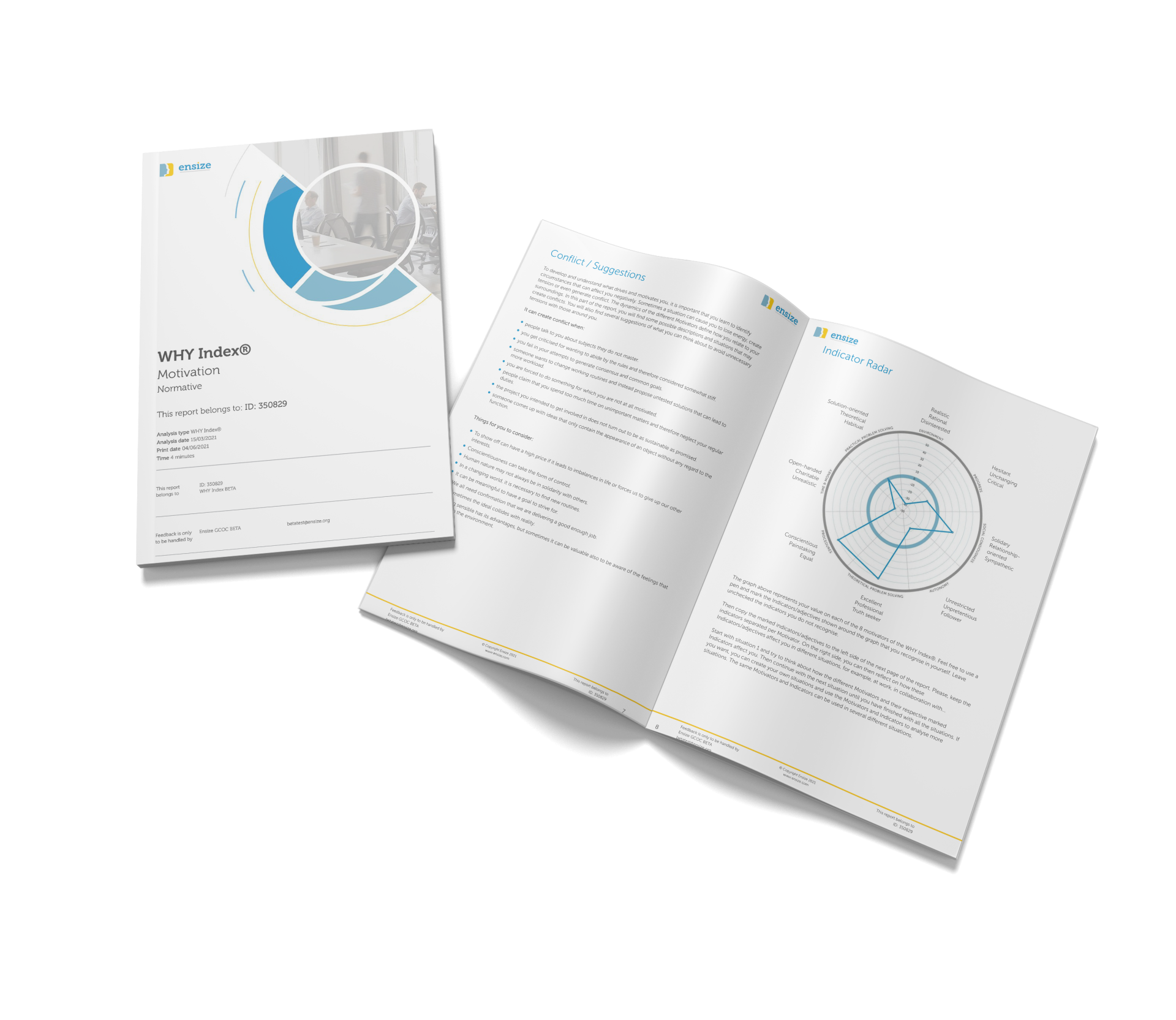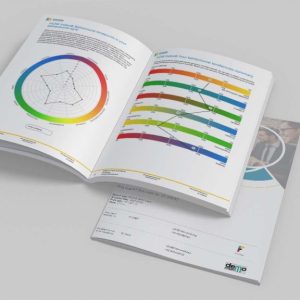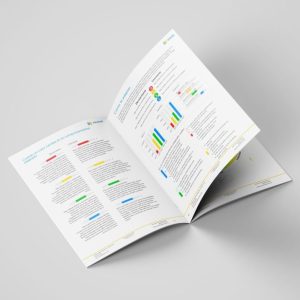WHY Index®
WHY Index®
WHY Index® is the ultimate tool for working with motivation, creating a foundation for stronger personal development and increased work performance.
This comprehensive motivational assessment explores the depth of individual motivators and provides a detailed understanding of an individual’s personal values and attitudes.
WHY Index® is a powerful assessment of the intrinsic motivations that influence behaviour, designed to provide a detailed understanding of an individual’s personal values and attitudes. WHY Index® describes different motivators and WHY a person acts in a certain way, based on personal values and attitudes. The uniqueness of WHY Index® is that it measures and describes both HIGH and LOW values in 8 different motivational factors and shows what a person tends to seek and what gives energy, but also what the person prefers to avoid or what causes stress and conflict, offering a comprehensive view of their motivational landscape.
WHY Index® is based on research by recognised experts such as Frederick Herzberg, Daniel Pink, and Victor Vroom’s well-founded theories with practical insights.
Read more in our White papers about the different areas of use >>.
Benefits of using WHY Index®:
- Detailed insights into personal drivers, increasing self-understanding and supporting personal and professional development.
- Describes why a person acts in a certain way based on their personal values and attitudes.
- Shows what a person is looking for and what gives them energy, but also what creates stress or conflicts.
Areas of use:
- Personal development: it can increase a person’s self-awareness and create a better understanding of what drives them, as well as help to provide a meaningful purpose and increase motivation and engagement.
- Recruitment: the assessment can create a better understanding of a person’s core values and motivations, which can help identify whether the person fits into the company’s culture and values.
- Group development: the tool can increase the understanding of the different motivational factors, and this information can be used to create a common vision and purpose.
- Leadership development: leaders can gain a better understanding of their own motivational factors and use this information to inspire and motivate their team.
- Sales development: salespeople can better understand their clients and what drives them. This can help create better communication and increase sales results.
- Conflict management: the tool can provide a better understanding of the different motivational factors underlying a conflict and can help resolve conflicts more effectively.
- Communication/collaboration: the assessment can help create an understanding of how different people communicate and what drives them.

The report:
- The scale gives a variety of clusters describing the high and low values in each motivator, allowing more than 1.6 million different reports/combinations. Every value on the scale has its own unique description.
- The Motivational indicator Radar gives a graphical overview of the personal values for the 8 motivators.
- The motivator profile graph shows the score on each of the 8 WHY Index® motivators in descending order of priority, from the highest to the lowest value.
- The graph shows what a person possibly seeks (positive values) and possibly avoids (negative values).
- Flexible comparison between profiles, groups, and organisations.
- Available in 6 languages (English, Swedish, German, Dutch, Spanish, French).
The WHY Index® focuses on 8 unique motivators
The Motivational indicator Radar gives a graphical overview of the personal values for the 8 motivators. The motivator profile graph shows the score on each of the 8 WHY Index® motivators in descending order of priority, from the highest to the lowest value. The graph shows what a person possibly seeks (positive values) and possibly avoids (negative values).
Time & Money — the person’s relation to profit and loss.
Theoretical problem-solving — the person’s view on information and news.
Environment — the person’s feeling for the surrounding environment.
Autonomy — the person’s view on power and influence.
Social consciousness — the person’s approach towards other people.
Progress — the person’s view on learning and development.
Procedures — the person’s approach toward rules and regulations.
Practical problem-solving — the person’s approach toward challenges


Find relevant and useful material in the Training Centre!
Training Centre is a part of the Navigator platform. In the Training Centre, you will find lots of relevant and useful material. Everything from PPT to well-thought-out exercises that are suitable for different purposes and goals. With the built-in filter, you can easily find exactly what you are looking for and need.
- Send out online material before, during or after a training/coaching session. You decide!
- Upload and brand your own material and reports.
- Fully remote: Online service — no software required.



